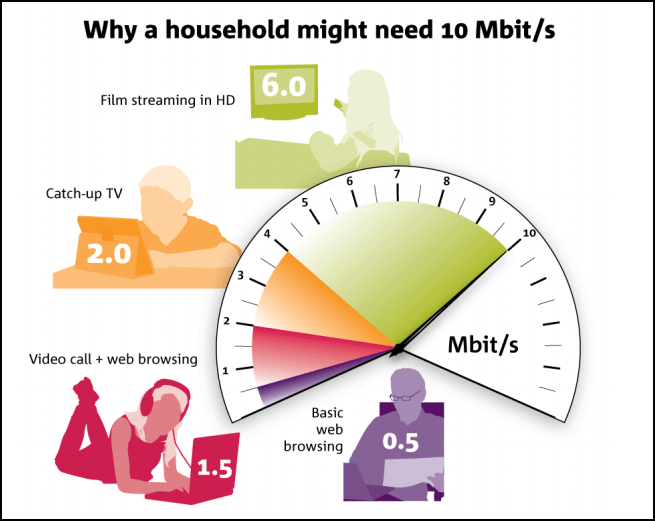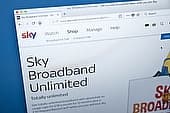Home > Broadband > News > General election ends hope of universal 30Mb broadband
General election ends hope of universal 30Mb broadband
THE House of Lords have watered down their own attempts to have the universal service obligation (USO) increased from 10Mb to 30Mb, after the announcement of the snap general election has forced Parliament to rush through with the passage of the Digital Economy Bill.

Ever since the Digital Economy Bill was first introduced in the House of Commons in July 2016, it included a clause that would guarantee broadband speeds of at least 10Mb for every home in the UK - surpassing the 2Mb set in 2009 (and achieved in late 2015).
However, once the bill passed its readings through the Commons, the House of Lords decided that the 10Mb target was too unambitious, and so introduced an amendment which stipulated that the minimum download speed to be achieved by 2020 should be 30Mb.
This benchmark would have provided a considerable boost for the 11% of the UK that doesn't have access to superfast (30Mb) broadband, yet it now seems that the Lords' demands have been abandoned and that the original 10Mb target will be restored to the bill.
Is 10Mb enough?
This restoration has its pros and cons, with one significant con being highlighted by Lord Mendelsohn.
In a February debate, he noted that an Ofcom report on the USO "indicates that 10 megabits will not be sufficient. It argues that this may be sufficient today, but not by the time the USO is proposed to be delivered."
That 10Mb won't be adequate in 2020 is perhaps the major reason as to why the Lords originally voted for their amendment. It seems as though they were hoping to save the UK's most secluded areas from having broadband speeds that, in 2020 and beyond, are already slow by the kinds of standards already set today by BT Infinity, Virgin Media and Hyperoptic.
Indeed, this is what certain internet service providers (ISPs) have argued as well, with KCOM's Bill Halbert declaring in March 2016, "The Universal Service Obligation of 10Mbps - in my view, that is not enough."
By contrast, in their latest UK Home Broadband Performance report, Ofcom state that they consider 10Mb to be "the speed which enables full participation in a digital society", since it provides just enough bandwidth to customers for them to be able to stream television in HD, make video calls, and browse the web.

Source: Ofcom, Home Broadband Performance 2015
However, while this would suggest that 10Mb is enough, their latest UK Home Broadband Performance report also notes that for customers subscribing to speeds above 2Mb and "up to" and including 10Mb, the average speed they actually received in November 2016 was only 4.2Mb.
Worse still, for those customers paying for speeds above 10Mb and below 30Mb, the average speed was only 9.9Mb.
The problem with moving the goalposts
This indicates how targets such as 10Mb often aren't enough, insofar as the actual speeds delivered by ISPs will almost inevitably fall short of them in many cases.
It's for this reason that it made sense to set the benchmark higher, and to aim for a minimum speed such as 30Mb. That way, even if customers end up receiving a bit less than 30Mb, they will at least get a decent enough speed, rather than something nearer to 5Mb.
That said, aside from being too complicated to deliver at a time when legislation needed to be rushed through because of the impending general election, there were several big obstacles to moving the USO up to 30Mb.
Most fatally of all, setting the USO at 30Mb would have effectively rewritten the targets of the Broadband Delivery UK (BDUK) project, which aims to make superfast internet accessible to 95% of the entire UK by the end of this year.
With a 30Mb USO, this aim would have been changed to covering 100% of Britain with superfast broadband, albeit by 2020.
Perhaps more damningly, the BDUK's target is in fact only "aspirational" and non-binding, whereas the USO is a legal obligation. As such, the BDUK would have suddenly become a legally binding undertaking for those ISPs participating in it, something which would have been met with fierce opposition by providers.
It also would have jeopardised the pledge BT made in October to achieve the USO themselves, without additional Government funding. With the obligation raised to 30Mb, they may have suddenly backed out of their commitment, leaving the Government with no one else to replace them.
What next?
And added to the increased price tag - £2 billion rather than £1.1 billion - the difficulty of ensuring at least 30Mb within three years has resulted in the amendment being shelved.
In its place, sources (cited in the Financial Times) have suggested that there will be measures in the final Digital Economy Bill that will allow for the USO of 10Mb to be reviewed at semi-regular intervals.
However, it hasn't been made clear as to whether the 10Mb minimum is something that actually has to be received by customers, or whether ISPs can get away with providing a connection that provides "up to" 10Mb.
Because if it's the latter, many of the customers who receive "up to" 10Mb (particularly rural customers who can't get superfast broadband) will find that they receive less, and that despite the promises of the USO, they'll still be excluded from the fast evolving digital landscape.
Receive consumer updates that matter in our newsletter

We are independent of all of the products and services we compare.

We order our comparison tables by price or feature and never by referral revenue.

We donate at least 5% of our profits to charity, and we aim to be climate positive.
Latest News

8 February 2026
TV licence to rise to £180 from April 2026
5 February 2026
Sky confirms April 2026 price rises for broadband and TVReceive consumer updates that matter in our newsletter



